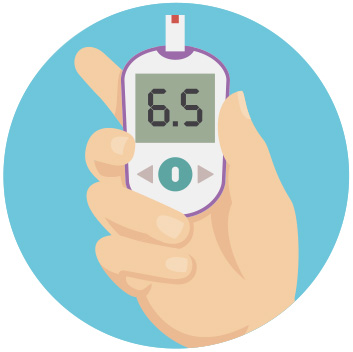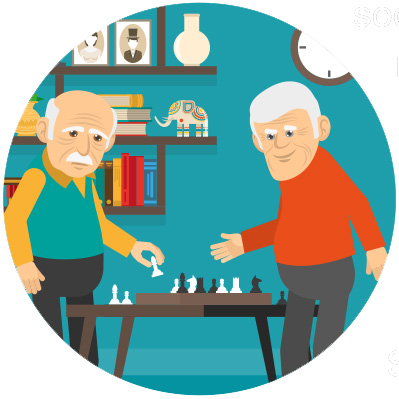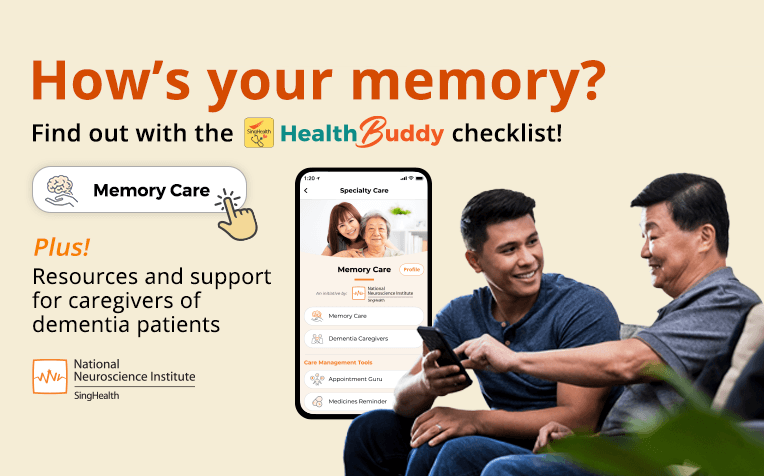Dr Vanessa Mok, Associate Consultant for Psychological Medicine, and Anuradha Kaliappan, a Senior Medical Social Worker, both from Changi General Hospital, share simple steps you can take to reduce your risk of getting dementia.
Losing one's memory is a terrible experience – one which a person with dementia has to live with. To reduce your risk of getting dementia, Dr Vanessa Mok, Associate Consultant for
Psychological Medicine, and Anuradha Kaliappan, a Senior Medical Social Worker, both from
Changi General Hospital (CGH), a member of the
SingHealth group, share some simple steps you can take.
Symptoms of dementia
Dementia describes a group of symptoms that includes:
-
Gradually worsening memory
-
Confusion
-
Loss of language skills
-
Mood changes
-
Difficulty in performing routine tasks
It is a disease of the brain and can be due to many causes, the most common being Alzheimer’s disease.
Age is the biggest risk factor for dementia – the older you are, the more likely you are to develop the condition – but
dementia is not a condition of ageing. The factors that can lead to dementia are complex, and in most cases, it is likely that our age, genes, medical history and lifestyle all contribute to our risk of developing the disease.
Tips to prevent dementia
However, there are simple things you can do that may help lower your risk of getting dementia:
 1. Eat a healthy, balanced diet
1. Eat a healthy, balanced diet
There is no diet recommended to be the best. However, a healthy diet includes eating low-fat, high-fibre foods, including fruits, vegetables and whole grains, while limiting the intake of salt, sugar and saturated fat.
Some fat in our diet is important, particularly unsaturated fat found in oily fish (such as salmon and sardines), nuts, seeds and avocados. However, too much salt may raise blood pressure, too much sugar could increase the risk of diabetes and saturated fats could increase cholesterol.
 2. Be physically active and exercise regularly
2. Be physically active and exercise regularly
Thirty minutes of moderate intensity exercise daily, five times a week, is the recommended minimum. The activity has to be intense enough to raise your heart rate and get you a bit out of breath. You could walk, cycle, swim or join an exercise or dance group. Regular exercise makes your heart and blood circulatory system more efficient, helping to lower cholesterol and blood pressure. Exercise is also good for your mental well-being.
 3. Maintain a healthy weight
3. Maintain a healthy weight
Go for regular health checks to monitor blood pressure, blood sugar and cholesterol levels. Follow your doctor's advice on exercise and diet. Maintaining a healthy weight also helps to reduce your risk of heart disease, stroke and diabetes.
 4. Don’t smoke
4. Don’t smoke
Smoking harms your lungs, heart and blood circulation. If you smoke, try to stop. Check out this article for
tips on how to quit smoking. If you need help to quit, call Quitline at 1800 438 2000 or visit I Quit at
healthhub.sg/programmes/88/IQuit
 5. Drink alcohol in moderation
5. Drink alcohol in moderation
Some studies have shown that alcohol consumption is linked to dementia. However, very heavy drinking is shown to cause alcohol-related dementia. If you do drink, moderation is the key.
Women should not drink more than two standard drinks a day and men should limit their intake to three standard drinks per day. A standard alcoholic drink is one can (330ml) of regular beer, half a glass (175ml) of wine or one nip (35ml) of spirit. A good way to reduce alcohol intake is to have several alcohol-free days in a week.
 6. Give your brain a daily workout
6. Give your brain a daily workout
Some studies have shown that keeping mentally active and maintaining strong social connections may lower the risk of cognitive decline. Activities could include reading, solving puzzles, playing number or word games, playing cards or learning something new. Social engagement can be achieved by visiting family or friends or have them visit you, joining a club or volunteering for a cause you believe in.
It is not possible to reverse our age, change our genes and there is no sure way to prevent dementia. The key to lowering the risk for dementia is to lead a healthy lifestyle, and engage in regular physical and mental activity. It is never too early to develop good habits, and it may be easier to adopt a healthier lifestyle if it is incorporated into your daily routine.
Ref: N18
Are you a caregiver looking after a loved one with dementia? Click the link to learn about simple do's and dont's.

Tap the banner above to find out how Memory Care on the Health Buddy app can help you maintain or improve your memory.
Plus, get tips on how to care for a loved one with dementia.
Check out our other articles on dementia:
Dementia in Singapore: Fast Facts
Dementia: What You Need to Know
Understanding Common Dementia Behaviours
Dementia and Depression: Is There a Link?
Young Onset Dementia (YOD): Dementia That Affects the Young
Brain Diseases: Early Signs to Look Out For
